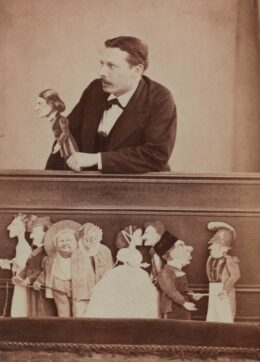
Printed
8 pages
Author(s)
Le Système de M. Prudhomme
The play Le Système de M. Prudhomme (M. Prudhomme’s system) is part of the volume Paris-Pantin : deuxième série des “Pupazzi” (Paris-Puppet: second instalment of the “Pupazzi”) published in 1868. In this book, the plays are preceded by several prologues, often improvised by Lemercier de Neuville before his performances.
As was the case in the two instalments of the first Pupazzi series (1866), the author creates his texts from contemplations on his time, portraits of personalities and accounts of recent events; for instance, one character is named after the actor of the Théâtre du Gymnase, François-Louis Lesueur (1819-1876). Another character is named Benoiton as a nod to Victorien Sardou and to his comedy in five acts La Famille Benoîton (The Benoîton Family) performed for the first time in Paris at the Théâtre du Vaudeville in 1865. Later, the proper noun “Benoîton” gave the article “benoîton” used in French to refer to wealthy people who exchanged their values for material wealth.
Monsieur Prudhomme is an emblematic character created by Henry Monnier (1799-1877), a French illustrator, caricaturist, and playwright. This character is a satire of the bourgeois man of Monnier’s time, symbolising the pretentiousness, rigid morality and conservative mind of the bourgeoisie during the first half of the 19th century.
A man plays in the casino
M. Prudhomme goes to the casino with the intention of winning back the dowry of his daughter Vénuska from a hundred sous note that dates back to Louis Philippe’s time. He pretends to have come up with his own foolproof system.
When he arrives, he encounters the comedian Lesueur (literally, The-Sweat), a regular of the casino, who says that he adopted all sorts of superstitions to have luck on his side. However, he admits that the day before, luck turned its back on him after he forgot to put a bean in his pocket as a lucky-charm.
Later, Lesueur comes back victorious: he finally won! M. Prudhomme advises him to stop here, but Lesueur decides to trade his bean for the leaf of an artichoke, hoping to extend his winning streak.
We learn that M. Prudhomme also has some “assets”: he came with Madame Benoiton who is known to always play the number 22 and to win every time. However, she is absent at this very moment.
Shortly after, Lesueur comes back disappointed: the artichoke leaf did not bring him luck and he lost everything. Discouraged, he decides to find comfort in a glass of absinthe.
M. Prudhomme finally tests his system and comes back victorious after having won twenty thousand francs for his daughter’s dowry. When questioned about the secret of his system, he maliciously addresses the audience and says that they will have to come back in a year to find out.
First performance
Publications and translations
Lemercier de Neuville, Paris pantin : deuxième série des "Pupazzi", Paris : A. Lacroix, Verboeckhoven, 1868.
